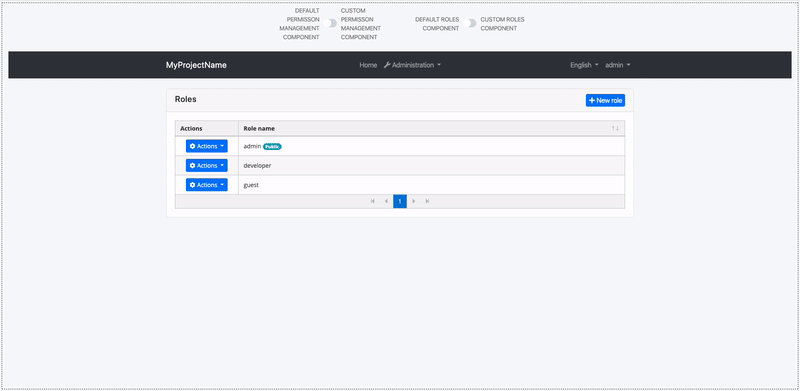Component Replacement
You can replace some ABP components with your custom components.
The reason that you can replace but cannot customize default ABP components is disabling or changing a part of that component can cause problems. So we named those components as Replaceable Components.
How to Replace a Component
Create a new component that you want to use instead of an ABP component. Add that component to declarations and entryComponents in the AppModule.
Then, open the app.component.ts and dispatch the AddReplaceableComponent action to replace your component with an ABP component as shown below:
import { ..., AddReplaceableComponent } from '@abp/ng.core'; // imported AddReplaceableComponent action
import { eIdentityComponents } from '@abp/ng.identity'; // imported eIdentityComponents enum
import { Store } from '@ngxs/store'; // imported Store
//...
export class AppComponent {
constructor(..., private store: Store) {} // injected Store
ngOnInit() {
this.store.dispatch(
new AddReplaceableComponent({
component: YourNewRoleComponent,
key: eIdentityComponents.Roles,
}),
);
//...
}
}

How to Replace a Layout
Each ABP theme module has 3 layouts named ApplicationLayoutComponent, AccountLayoutComponent, EmptyLayoutComponent. These layouts can be replaced with the same way.
A layout component template should contain
<router-outlet></router-outlet>element.
The below example describes how to replace the ApplicationLayoutComponent:
Run the following command to generate a layout in angular folder:
yarn ng generate component shared/my-application-layout --export --entryComponent
# You don't need the --entryComponent option in Angular 9
Add the following code in your layout template (my-layout.component.html) where you want the page to be loaded.
<router-outlet></router-outlet>
Open the app.component.ts and add the below content:
import { ..., AddReplaceableComponent } from '@abp/ng.core'; // imported AddReplaceableComponent
import { eThemeBasicComponents } from '@abp/ng.theme.basic'; // imported eThemeBasicComponents enum for component keys
import { MyApplicationLayoutComponent } from './shared/my-application-layout/my-application-layout.component'; // imported MyApplicationLayoutComponent
import { Store } from '@ngxs/store'; // imported Store
//...
export class AppComponent {
constructor(..., private store: Store) {} // injected Store
ngOnInit() {
// added below content
this.store.dispatch(
new AddReplaceableComponent({
component: MyApplicationLayoutComponent,
key: eThemeBasicComponents.ApplicationLayout,
}),
);
//...
}
}































































